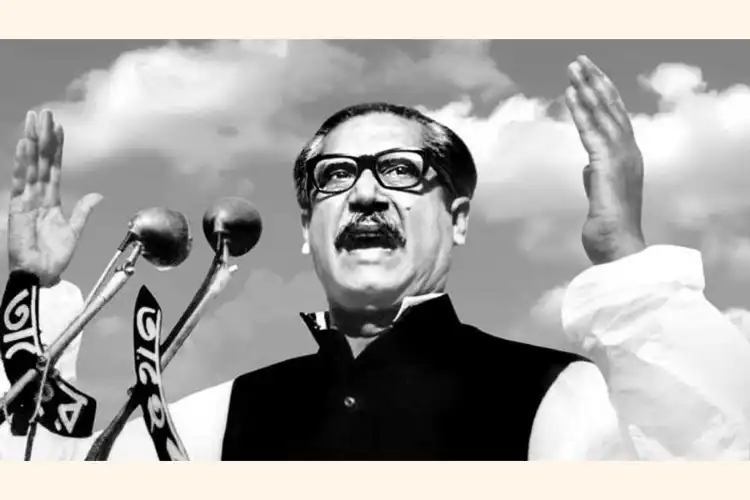
ARIF HASAN/DHAKA
With over a decade-old interview of the confessed killer of Bangladesh’s founding father Bangabandhu Sheikh Mujibur Rahman, the credibility of “highly controversial” media personality Zillur Rahman is once again on the line. The interview was recorded in Pakistan – a country that backed Bangabandhu’s killer.
Zillur kept the interview a secret until now. He as a moderator served the killer’s interests justifying the murder of Sheikh Mujib. The interview was aired by a private television channel when the country was ruled by a military-backed caretaker regime.
In January 2007, a caretaker government – reportedly blessed by the military – took over in Dhaka, framed false charges against top political leaders and made a botched attempt to install a puppet regime. All the tell-tale signs indicated the depoliticization efforts of a section of western diplomats – calling the shots from behind the curtain.
During that regime, media personality Zillur who hosted a popular talk show, along with pro-BNP-Jamaat intellectual Prof Ataur Rahman, happened to wield much influence, according to a senior journalist.
Years before, during the BNP-Jamaat government’s tenure, Ataur took part in a teachers’ body election from the BNP-Jamaat panel at his former workplace, Dhaka University.
Zillur, who brags of being a pioneering talk-show host, also earlier invited confessed war criminal Salahuddin Quader Chowdhury on his show. Chowdhury capitalized on the opportunity by offering some justification for his war crimes.
Called the “master of genocide” (https://www.thedailystar.net/video-stories/watch-now-sq-chy-the-master-genocide-174925) in the port city Chattogram, for his brutal war crimes to aid Pakistani armed forces during the Liberation War in 1971, SQ Chowdhury tried his best – through carrying out genocide and assassinating intellectuals and renowned professionals – to stop the birth of Bangladesh. He met his end in a Dhaka jail, following a long trial – bringing in long-awaited justice for victim families.
“Inviting such confessed murderers, terrorists, and war criminals on his show, giving them a platform to circulate their anti-national and terrorist views, without holding them accountable for their actions with proper questions, clearly contradicted his façade of neutrality. Would it be an overstatement to him a BNP-Jamaat propagandist?” – the managing director of a leading television channel wondered.
“During the 50 years of the country’s independence, we all know the motives behind war crimes perpetuated in 1971, and behind the assassination of Sheikh Mujib – part of a larger conspiracy backed by Pakistan. Why do we need to glorify these murderers and criminals? Do we see BBC or other renowned western media outlets allowing Nazis or Nazi sympathizers to glorify war crimes during the Second World War?”
The recent outcry surrounding Zillur turned into a highly contested debate as the media personality with a chequered history hosted a series of interactions with diplomats under the front of his non-government organization called ‘The Center for Governance Studies (CGS). Two leading TV channels also reported that Zillur, who is also the executive director of CGS, holds a nexus with BNP politician Zahir Uddin Swapan, who now plays a lead role in managing BNP’s media wing.
Despite being no regulatory body, CGS held a host of interactive events involving representatives from BNP and AL, as well as diplomats stationed in Dhaka. But, the framing of questions over the state of the country’s democracy and allegations pressed by Islamist opposition to drag diplomats into Bangladesh’s internal affairs has drawn widespread condemnation.
Former diplomats and international relations experts have condemned this move of pursuing diplomats to remark on the country’s internal issues with an agenda.
Referring to the Geneva Convention – a set of rules diplomats strictly need to adhere to – former diplomat Wali-ur Rahman said, “Diplomats should refrain from getting involved in any act that might cause a dent in bilateral ties. Rather, they should focus on enhancing ties that can result in bigger dividends.”
“No country in the world is perfect. In the United States, are diplomats from other countries allowed to make such observations regarding its internal matters?” – questioned Prof Imtiaz Ahmed, the country’s leading academic in international relations, who teachers at Dhaka University and has authored, co-authored, or edited 26 books and 8 monographs.
When asked for comments, Zillur locked in a spar with journalists to defend his stance, without explaining or justifying his motive.
Faced with questions over the rationale behind such platforms, a visibly enraged Zillur told a press briefing, “I don’t care, actually… This is not the time to care about these things. If you care about all these things, you can’t proceed”.
Asked about the financial sources required to arrange and run his NGO, Center for Governance Studies, Zillur decided to keep the sources undisclosed but replied, “We earn money from various sources… we are not a typical NGO.”
ALSAO READ: India fought for freedom of Bangladesh as world didn't care
Zillur admitted to his ties with BNP leader Zahir Uddin. “Yes, I have personal ties with him,” Zillur said. He refuses to comment on allegations that his reports are meant to further an agenda.
(Arif Hasan is a Dhaka based journalist)
